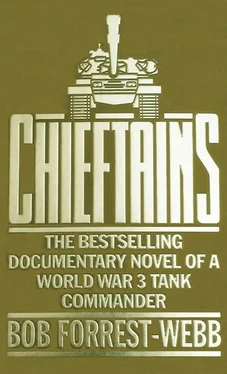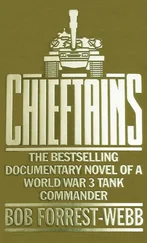At the 1st Battle Group Field Headquarters, Lieutenant Colonel James Studley was attempting to ingnore casualties in terms of human death, and view them instead as incidents requiring only tactical assessment. It was not easy. The British Chieftains being destroyed were his tanks, and no matter how hard he tried it was impossible to forget they contained the bodies of his men. Out there in the smoke were young troopers he had lived with, trained from civilian to soldier, congratulated, promoted, reprimanded. He had learnt early to hate the enemy.
One complete squadron of his Chieftains was already out of action, the vehicles destroyed, and the crews either dead or wounded. It had happened in the first few minutes of hostilities. The squadron’s positions had been struck by a massive rocket attack that had immediately wiped out about half of Alpha Squadron’s tanks. The fire on the Chieftains had been so accurate that Studley was convinced their location had been radioed back to the Soviet artillery by infiltrated or sleeper artillery observers, who must have been inside NATO territory well before the outbreak of war.
He had ordered the remaining tanks of Alpha Squadron to withdraw towards Königslutter, but before they could do so, further artillery fie and a strike by a formation of helicopter gunships had obliterated them.
The other two squadrons of the battle group had both suffered casualties in the artillery barrage. C troop of Charlie Squadron had lost all their vehicles although there were several crew survivals; all wounded, who had already been evacuated to the casualty collecting post at Burgdorf with the survivors of Alpha. B and C Troops of Bravo Squadron had both lost one Chieftain apiece, with no crews surviving. The leader’s tank of Bravo Squadron had received a hit near the turret ring from an armoured piercing shell which had failed to penetrate, but dislodged the turret, crippling the vehicle and breaking the leader’s right arm.
Studley, although he was finding it difficult to analyze the situation beyond his own frontage, had a clearer picture in the Elm Sector than most. Division HQ were keeping their battle group commanders reasonably well informed, and from his present field headquarters in the derelict barn, Studley could see far across the lower ground of the moor and northwards to the positions of the 2nd Battle Group between Helmstedt and the Hassenwinkel. South-west, but hidden by the ridge of high ground of the moor, was the 3rd Battle Group on the outskirts of the town of Wolfenbüttel.
The wind had veered to the south-east, and the cloud was beginning to break. The sky, in the direction of the coming weather, was bright. Later in the day there would be autumn warmth in the sun. Studley had been praying for rain; a torrential downfall to flood the rivers and turn the ploughed fields into quagmires, swamps beneath the tracks of the invading armour. Now, drawing on a lifetime’s experience as a trout fisherman, he could sense the rising barometer and knew the weather would favour the enemy for the next twenty-four hours.
The heaviest Soviet attacks, on the positions defended by the battle groups of the 4th Armoured Division had, as Studley expected, come from the direction of Magdeburg behind the East German frontier. Here there was the autobahn and railway, which had undoubtedly been used in the reinforcement of the Soviet army in the past few hours. They would continue to make use of it until it was destroyed. The first heavy thrust of Soviet assault armour, following their artillery bombardment of the NATO forward positions, had carried them across the NATO border minefields. Under cover of further intense artillery fire and using dense smoke, despite their shattering casualties the Soviet army had forced the withdrawal of the 2nd Battle Group, pressing it quickly northeast as their spearhead attempted to widen the breach between the 2nd and Studley’s group south of the main Soviet attack.
There were secondary thrusts in both the north and south of the 4th Armoured Division sector, one cutting north-west directly at Wolfenbüttel, the other towards Wolfsburg. The 3rd British Armoured Division to the south was under heavy pressure between the Oderwald and Goslar where the front had already buckled to a depth of eight kilometers; its battle groups were facing attacks from two directions as a result of successful landings of Soviet airborne troops and light armour.
Studley was now watching the advancing Soviet tanks through his binoculars. It was difficult, for their artillery was laying smoke ahead of them and the screen was effective. Occasionally the blanket of smoke swirled and within, for a few seconds, he would glimpse the dark hulk of some vehicle.
The battle group’s two batteries of Abbots had been involved in almost continual activity, their gulls were already hot. Each carried forty rounds of ammunition for the 105mms, but would soon need replenishment. It had been nearly impossible for the observers to detect clear targets for them, but they were doing a useful job of work with local harrassing fire. To minimize the risk of accurate pinpointing of their positions, and subsequent retaliatory bombardments, Studley was keeping them on the move; a few quick shots and then away. Their movement on his situation map was beginning to look like a spider’s web.
Somewhere deep inside the layer of smoke, the Soviet armour had reached the second line of minefields. Added now to the thunder of their artillery support were the satisfying dull thumps of the mines, and where they exploded the mist turned crimson and churned black with fuel smoke.
Studley had been attempting, with no luck so far, to obtain the use of a command helicopter. It had been promised but had not arrived. He wanted to get above the position, if only briefly, to obtain a clearer idea of the enemy’s intentions. The information he was getting over the rear net from Division was frequently too broad to be of great use to him. It seemed to him his battle group ms facing the spearhead of a main Soviet thrust, but this could be a feint to lead him to commit his men when perhaps the real attack was yet to come, elsewhere.
The air activity had increased over the battle zone, though much of it was at a high level above the broken cloud. There had been a brief attack by three East German Sukhoi Su-15s, who had come in from high altitude in the east, lost in the glare of the rising sun, in a Mach-2 30-degree dive. AA-8 missiles had been fired into a position evacuated minutes before by the Abbots. The battle group had suffered no casualties in the attack that lasted only seconds, and the Su-15s had not returned.
His adjutant drew his attention away from the battlefield. ‘Charlie Squadron are engaging, sir.’
‘Good. Order them to retire as soon as it gets too hot.’
‘Yes, sir.’ The adjutant thought it unnecessary to tell his CO the identical message, with the coded reference, for Charlie’s new positions had already been sent out on the net.
Inkester shouted: ‘Where is it? I’ve lost it!’
‘Calm down… there, two o’clock, on the edge of the smoke.’ Sergeant Morgan Davis saw the T-72 as a dark silhouette through the ‘times-ten’ magnification of his sight. The Soviet tank was three-quarters-on to Bravo Two, bucking as it crossed the furrowed land three thousand meters away, swerving occasionally to avoid the wider craters in its path.
‘I’ve got it.’
‘Take your time.’
‘Sod… the bastard’s gone.’
‘Steady… there.’ Davis was using the coupled sight giving him an identical view to that of Inkester the gunner. The sights were settled on the hull of the T-72 as Inkester traversed the gun. The tank heaved upwards with the shock as the gunner hit the firing button and the propulsion charge detonated in the breech. With the engine on tick-over the roar of the gun was impressive within the confines of the fighting compartment. An automatic flashguard within the sight protected the eyes of the gunner and commander from the glare of the barrel flame, but smoke from the muzzle blurred their vision for a few seconds.
Читать дальше












